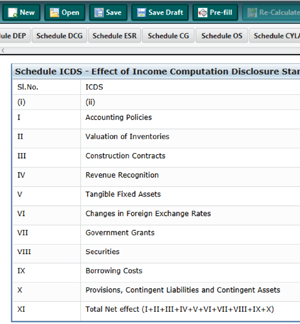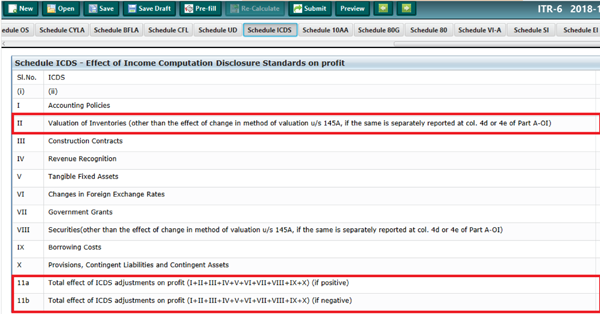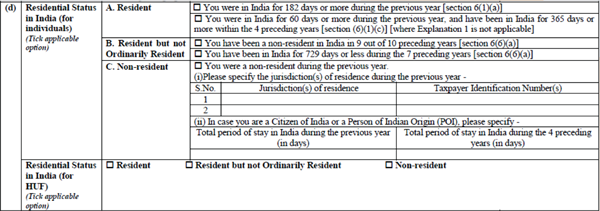Applicability Of Income Tax Return Form and Due date for filing ITR
Major Changes in ITR Forms
General Changes ITR Forms:-
Key Changes in Income Tax Return for Assessment Year 2019-20
Applicability Of Income Tax Return Form and Due date for filing ITR
ITR Form | Parculars | Due Dates | ||
| ITR 1 |
| 31st July, 2019 | ||
ITR 2 | Any Individuals and HUFs not having income from Profits and Gains from Business or Profession. | 31st July, 2019 | ||
ITR 3 | Any individuals and HUFs having income from Profits and Gains of Business or Profession.
| 31st July, 2019 (30th September, 2019 in case Audit is Required) | ||
ITR 4 | Any Resident Individual (ROR), HUFs, Firms (Other than LLP) declaring income on presumptive basis under the head Business and Profession which is computed as per:-
Resident Individuals having Income on presumpve basis under the head Business and Profession related to Secon 44AD/44ADA/44AE are restricted from filing ITR 1.Such Resident individuals are only eligible to declare their income in ITR 4. WHO CANNOT USE ITR-4
| 31st July, 2019 (30th September, 2019 in case Audit is Required | ||
ITR 5 | Person required to file Form 5:-
| 31st July, 2019 (30th September, 2019 in case Audit is Required) | ||
ITR 6 | Companies other than companies claiming exempon u/s 11 | 30 September, 2019 | ||
ITR 7 | Persons (including companies):-
| 31 July, 2019 th (30 September, 2019 in case Audit is Required) |
Belated Return:-
Any person, who has not furnished a return in above mentioned my period, may furnish the return before the end of the relevant assessment year i.e. 31 March 2020 for Assessment Year 2019-20.
Revised Return:-
Any person, who has furnished an Original or Belated Return in above mentioned my period, may furnish the Revised Return before the end of the relevant assessment year i.e. 31st March 2020 for AY 2019-20.
Return to be filed electronically:-
For AY2019-20 every taxpayer has to file ITR electronically except a super senior citizen who files return in ITR-1 or ITR4. The open available with taxpayers having income less than 5 lakhs during the previous year to file a physical return has been withdrawn.
Major Changes in ITR Forms
Person having Salaried Income [ITR 1, 2, 3, 4]
1. Tax deduction and collection account number (TAN) of employer is mandatory if tax is deducted.
2. Separate Reporting of all Deductions u/s 16 is required, namely:
- Standard deduction u/s 16(a);
- Entertainment allowance u/s 16 (ii);
- Professional tax u/s 16(iii
Person having Capital Gain during the year [ITR 2, 3, 5, 6]
In case assessee has transferred any Immovable Property and has earned Capital Gains, then it is mandatory to furnish the following information about the buyer:-
- Name of Buyer;
- PAN of Buyer is mandatory if the tax is deducted u/s 194IA;
- Percentage share and amount, if more than one buyer;
- Address of Property;
- PIN Code.
In Budget 2018, Secon 10(38) Exemption was withdrawn, and accordingly, the long term capital gain from sale of equity shares or unit of an equity-oriented mutual fund shall be taxed as per the provisions of Secon 112A. Therefore, assessee is required to disclose the following details:-
- Full Value of Consideration Received;
- Cost of Acquisition without Indexaon;
- Fair market value of capital asset as on 31.01.2018;
- Cost of Improvement without Indexaon;
- Expenditure Incurred related to transfer;
- Investment made u/s 54F.
Net Agricultural Income exceeds Rs. 5 Lakhs [ITR 2, 3, 5, 6
New form requires additional details if the income from agricultural actives exceeds Rs. 5 lakhs. The following information is required to be disclosed:-
- Name of district along with pin code in which agricultural land is located.
- Measurement of land in Acre.
- Whether the land is owned or held on lease
- Whether the land is irrigated or rain-fed.
Reporting of Income not chargeable to tax as per DTAA [ITR 2, 3, 5, 6]
In respect of income which are not chargeable to tax taking the benefit of Double Taxation Avoidance Agreement, new ITR forms
require following additional information:-
- Amount, Nature and Head of Income;
- Country name & Code;
- Article no. of DTAA;
- Whether TRC obtained
Changes in Reporng of Profit and Loss Account [ITR 3, 5, 6]
Profit and Loss Schedule is amended and is divided into following three new parts:
- Manufacturing Account;
- Trading Account;
- Profit & Loss Account.
Thus, if assessee is engaged in Manufacturing Acviesthen he shall provide
- Cost of Goods Sold through Manufacturing Account;
- Gross Profit through Trading Account;
- Net Profit through Profit and Loss Account.
Manufacturing account is not meant for service providers and traders. Hence, they can start directly from trading account. In case Assessee earns income from Speculave Actives, following information is required to be reported in that schedule:-
- Turnover from speculative
- Gross profit, Expenditure
- Net income from speculative
In case, Assessee has opted for Presumptive Scheme u/s 44AD/44ADA/44AE- Business name, Code & Description of business needs to be disclosed. [ITR 3,4,5,6]
In case assessee has claimed bad debts of an amount exceeding Rs. 1 Lakhs, it is mandatory to furnish name and address of the debtor in case PAN of such debtor is not available.
Under new ITR Form, GSTIN Number and Annual value of outward supplies as per GST return filed by assesse is to be disclosed.
Details by Individual and HUF who are partners in Partnership Firm [ITR 5]
The following information is required to be furnished:-
- Name of the firm;
- PAN of the firm;
- Whether the firm is liable for tax audit?
- Whether the firm is liable for transfer pricing audit?
- Profit-sharing Rao infirm
- Share of profit from firm
- Capital balance as on 31st March of the previous year in the firm
With effect from Assessment Year 2019-20, Rule 12 of the I-T Rules has been amended to exclude sections139(4E) and 139(4F) from the list which are applicable to Business Trust and Investment Funds respectively, which means these trust will not be able to file ITR-7. Therefore, such assesses have to use ITR-5 to file their returns.
Reporting Regarding the Foreign Assets [ITR 2, 3, 5, 6, 7]
Reporting requirements in respect of foreign assets have been increased. Now, the following additional information is required to be disclosed:-
- Besides Foreign Bank Accounts, Details of Foreign Depository Account are required.
- Details of foreign custodial accounts
- Details of foreign equity and debt interest held in equity, financial interest in any entity (including any beneficial interest), any immovable property held at any time during the relevant year
- Details of foreign cash value insurance contract or annuity contract
- Details of other capital assets held at any me during the relevant period.
- Details of account in which assessee is having any signing authority
- Details of any trust incorporated outside India in which assessee is trustee, beneficiary or seller
Reporting requirements for Foreign Companies [ITR 6]
Foreign Companies are required to report the following information about their immediate and ulmate parent company:-
- Name and Address of Parent Company.
- Country of residence.
- PAN (if allowed).
- Tax Idenficaon No. or Unique Idenfy No. of the parent company as per its country of residence
Reporng requirements for Start-ups
- Registraon number [ITR 5, 6]
The following informaon regarding eligible start-ups approved by DPIIT is required:- Registraon no. alloed by DPIIT
- Cerficate Number of the cerficate received from Inter Ministerial Board.
- Date of filing of form 2 with DPIIT
- Shareholding [ITR 6]
To track issue of shares by start-ups, “Schedule SH 2”has been incorporated in ITR wherein start-ups are required to provide the following informaon about the shareholders and the share applicant (in case allotment is pending):-- Name, PAN, Category of shareholder;
- Type of share
- Date of allotment/Date of applicaon of shares;
- Number of shares held/No. of shares applied for by the shareholder;
- Face value, Issue Price, Paid up per share;
- Share applicaon money in case allotment is pending;
- Share premium.
Further, in case a person, who was a shareholder at any me during the previous year, but ceases to be a shareholder at the end of the previous year, following addional informaon are required to be furnished:- - Date on which he ceased to be shareholder;
- Mode of cessaon;
- PAN of new shareholder in case of transfer
- Assets and Liabilies [ITR 6]
Start-ups registered with DPIIT are exempted from levy of angel taxaon. This exempon comes with various condions which restrict the investment of such sums in various assets such as land or building, loans or advances, share or securies etc. Accordingly, to the ensure such compliances, a new schedule AL-2 has been inserted under which the details about the assets and liabilies are required to be furnished, such as, date and cost of acquision of asset, purpose for which asset is used, PAN of the person from or to whom loan or advance is given or accepted, vehicle registraon number etc. Similar schedule AL 1 has been inserted for unlisted companies as well.
Reporng requirements for Un-listed Companies
- Shareholding [ITR 6]
In “Schedule, SH 1” wherein Unlisted Companies (other than start-ups) are required to provide the following information about the shareholders and the share applicant (in case allotment is pending):-- Name, PAN, Category of shareholder;
- Type of share
- Date of allotment/Date of application of shares;
- Number of shares held/No. of shares applied for by the shareholder;
- Face value, Issue Price, Paid up per share;
- Share application money in case allotment is pending;
- Share premium
Further, in case a person, who was a shareholder at any me during the previous year, but ceases to be a shareholder at the end of the previous year, following additional information are required to be furnished:- - Date on which he ceased to be shareholder;
- Mode of cessation;
- PAN of new shareholder in case of transfer.
- About Assets and Liabilities [ITR 6]
A new Schedule AL-1 has been inserted which mandates the Un-listed Companies (other than start-ups) to furnish the following information:-- Land and Building appurtenant thereto, or both, being a residential house;
- Land and Building or both not being in the nature of residential house;
- Unlisted equity shares held, transferred or acquired during the year;
- Other securies held, transferred or acquired during the year;
- Capital Contribuon to other enty;
- Loan & Advances to any other concern;
- Motor Vehicle, Aircra, Yacht or other modes of transport acquired;
- Jewellery, Archaeological Collections, Drawings, Paintings, Sculptures, any work of art or bullion acquired;
- Loans, Deposits and Advances taken from a person other than financial institution.
Ulmate Beneficial Ownership [ITR 6]
Unlisted companies are required to provide details of natural persons who were ulmate, beneficial owners, directly or indirectly, of shares holding not less than 10% of the voting power at any me of the previous year in General Information.
Under the Income Tax Act, beneficial owner means person who has paid for an asset (directly or indirectly) for immediate or future benefit (directly or indirectly) of himself or any other person
Capital Gains – Secon 50CA [ITR 2,3, 6 and 7]
Foreign Companies are required to report the following information about their immediate and ulmate parent company:-
- Changes have been made so as to reflect full value consideration in accordance with provisions of section 50CA of the Act, both in case of short-term and long-term capital gains.
- Secon 50CA was inserted by the Finance Act, 2017 w.e.f. AY 2018-19, as a part of an-abuse measures. It deals with the fair value of assets being unlisted shares transferred at nil/inadequate consideration for the purpose of computation of capital gains (Similar to that of section 50C).
- New ITR Forms require the taxpayer to provide figures of actual sales consideration and FMV as determined by a Merchant Banker or CA and it has been made mandatory to obtain a valuation report. The new ITR Forms require assessees to provide the information regarding actual sale consideration and FMV in respect of unlisted shares.
- This could be the reason why details of capital gains from transactions to which section 50CA of the Act is applicable, have been asked for separately in the ITR.
- The process of determination of fair market value in terms of Rule 11UAA needs to be initiated in advance.
Income Computation Disclosure Standards (ICDS) [ITR – 3 and 6]
Profits and gains of business or profession
Schedule ICDS requires disclosure of effect of each ICDS on the profits. Accordingly, the aggregation of such ICDS impact in
“positive” and “negative” could be with the objective of obtaining (auto collection) some statical data.
- Effects on the profits and losses due to ICDS have to be reported in two categories instead of a consolidated figure − Increase in profit or decrease in loss due to deviation as per ICDS − Decrease in profit or increase in loss due to deviation as per ICDS
- In the method of valuation of closing stock also, effects due to deviation from valuation method under section 145A have to be reported in two categories − Increase in profit or decrease in loss − Decrease in profit or increase in loss
- The total effect of ICDS adjustments on profit is bifurcated into positive effect and negative effect instead of the net effect


Registration under any other law [ITR 7]
Details of registration under any other law are also required to be reported are as follows:-
- Law under which registered;
- Date of registration or approved;
- Approval/Noficaon/Registration Number;
- Approving/ Registering Authority
Source of fund to meet Revenue and Capital Expenditures [ITR 7]
Now the trusts are liable to furnish the details of source of fund to meet capital and revenue expenditure incurred by them in following manner:-
- Income derived from the property/income earned during the previous year;
- Income deemed as application in any preceding year;
- The income of earlier years up to 15% accumulated or set apart;
- Borrowed fund;
- Others
General Changes ITR Forms:-
Addional Informaon in case of Residenal Status:-

In case assessee is Director in a Company at any me during the previous year, details required to be furnished are as follows:-
- Name of Company.
- PAN of Company.
- Whether its shares are listed or unlisted.
- DIN.
In case assessee having Unlisted Equity Shares at any me during the previous year, the details required to be furnished are as follows:-
- Name of Company.
- PAN of Company.
- No. Of Shares and cost of acquisition held as on 01st April 2018.
- No. Of Shares, face value, issue price and date of shares acquired during the year.
- No of Shares and sale consideration transferred during the year.
- No of Shares and cost of shares held as on 31st March 2019.
Separate Reporng of Income under ‘Income Chargeable under the head Other Sources’ are as follows:-
- Interest from Saving Account;
- Income from Deposit (Bank/Post office/ Cooperative Society);
- Interest from Income Tax Refund;
- Family Pension;
- Any Other.
In case Resident Individual has made donations towards scientific research or rural development, following information is required to be furnished:-
- Name and address of donee;
- PAN of donee;
- Amount of donation made in Cash and in other modes.
The new detailed ITR forms issued will surely add up to the details available with department and enhance the effectiveness of department while processing the returns. This can also be concluded that the aim of the department with new disclosures is to gather the data. These data will help the authorities to cross-check the details furnished by the taxpayers and will lead to a more transparent
economy
How Inmacs can help:
- Carefully filing of returns of income duly disclosing the requisite information;
- Avoid penalty which can be levied due to non-furnishing of details;
- Analysing the details required to be filed in the return;
- Precautionary cross-checking of details with other available information.

